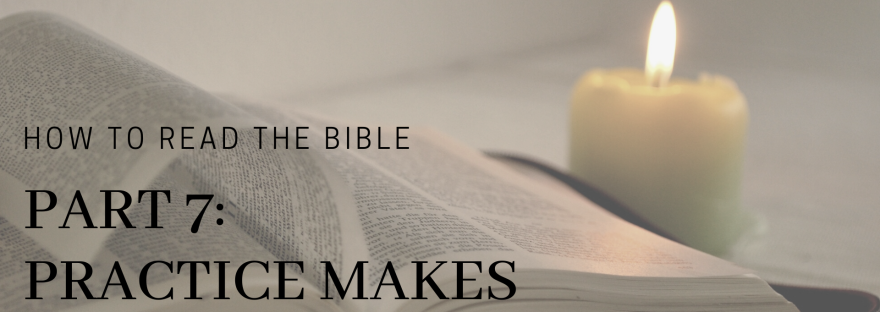I have to be honest that after teaching Bible study this way for several years, I thought it would be simple to convert into a blog. However, taking what I’d normally discuss with a group over the course of an hour and trying to reduce it down into a concise blog format proved to be much harder than anticipated.
For the sake of what we can cover here today, I zoomed in on one passage from Ephesians. I would recommend, however, for your own study, that you read the surrounding chapters (or even the whole book) to grasp the larger picture. As we read from Ephesians 2, we are going to journey through the Inductive Guide so you can practice alongside me. For each section of the guide, I will explain what I do and then provide bullet-point information of the notes I would take in my journal. This is meant to give you ideas; it is not the only way to think about the passage and/or study scripture. The more you practice, the more you’ll find a rhythm that works for you. If you can, grab your Bible and turn to the book of Ephesians. Otherwise, I will also have the verses here. A printable version of today’s practice will be available at the bottom.
Ephesians 2:11-22
JEW AND GENTILE RECONCILED THROUGH CHRIST
Genre:
Here, I think about where the book of the Bible is located, use the Genre Guide, or look at the intro in a study Bible to help me determine what genre I’m reading.
- Letter: sometimes referred to as Epistles.
- Written in response to a specific need or circumstance.
Context:
For today’s purpose, or when I’m preparing a lesson plan for Bible study, I do dig into the context a bit deeper than for daily reading by utilizing some of the Tools I mentioned. But even knowing general context helps unveil new layers of the text. This where it’s helpful to use that study Bible introduction and think about where the book is located in the Biblical Timeline. In this case, Ephesians is written after Christ’s death and resurrection, when the new churches of Christian believers are being formed and undergoing heavy persecution.
- Author: Written by Paul, the apostle, around 60 AD. One of the 4 letters written while in prison in Rome.
- Original Audience: new Gentile Christian believers in Ephesus and the general Mediterranean area. Written to encourage them in their new faith and to encourage unity. (Gentile simply means “not Jewish”)
- Listeners would have known that Paul was currently imprisoned in Rome after being accused by Jewish leaders that he brought an Ephesian Gentile beyond the temple’s outer court (see Acts 21:27-29)
- Ethnic and cultural differences between the Jewish and Gentile believers had become an area of contention in the Ephesian church. This brand new church was in danger of becoming 2 separate churches.
- When we enter the scene, this new church is fragmented, and Gentile Christians are being made to feel lesser than because they’re not Jewish (and not circumcised). Paul comes in and makes it very clear about their worth in the kingdom of God.
Observe: What does the passage say?
At this point, I begin reading and make notes along the way about significant points, themes, etc. I pause every couple or few verses to write down what I want to remember. I may also jot down other verses of which I’m reminded.
11 Therefore, remember that formerly you who are Gentiles by birth and called “uncircumcised” by those who call themselves “the circumcision” (which is done in the body by human hands)— 12 remember that at that time you were separate from Christ, excluded from citizenship in Israel and foreigners to the covenants of the promise, without hope and without God in the world. 13 But now in Christ Jesus you who once were far away have been brought near by the blood of Christ.
- Vs 11 & 12: Remember what life was like before Christ!
- Before Jesus and the coming of the Holy Spirit, the Jews did not realize that salvation would ever be extended to the world, to people outside of themselves. This was a big deal for Gentiles! (word for a non-Jew)
- Without hope
- Vs 13: Jesus dying on the cross changed everything. Jesus allowed them to be part of the family.
- Ephesians 1:5- “he predestined us to be adopted as his sons through Jesus Christ”
14 For he himself is our peace, who has made the two groups one and has destroyed the barrier, the dividing wall of hostility, 15 by setting aside in his flesh the law with its commands and regulations. His purpose was to create in himself one new humanity out of the two, thus making peace, 16 and in one body to reconcile both of them to God through the cross, by which he put to death their hostility. 17 He came and preached peace to you who were far away and peace to those who were near. 18 For through him we both have access to the Father by one Spirit.
- Vs 14/15- Jesus is our peace. He destroyed the barrier, between people and with God. Jesus brought reconciliation/atonement for our sins.
- 1 John 2: 1-2 “But if anyone does sin, we have an advocate with the Father– Jesus Christ, the Righteous One. He is the atoning sacrifice for our sins, and not only for ours but also for the sins of the whole world.”
- Vs 15/16- Create a new humanity from the two = means to reconcile the two sides.
- Vs 17- Christ’s message of salvation was for everyone; Jew and Gentile.
- Vs 18- Both have access to the Father because of Jesus.
19 Consequently, you are no longer foreigners and strangers, but fellow citizens with God’s people and also members of his household, 20 built on the foundation of the apostles and prophets, with Christ Jesus himself as the chief cornerstone. 21 In him the whole building is joined together and rises to become a holy temple in the Lord. 22 And in him you too are being built together to become a dwelling in which God lives by his Spirit.
- Vs 19- All part of God’s family; citizens.
- Vs 20-22- Jesus holds it all together; the cornerstone; he’s the unifier. Everything is built off of Jesus.
Interpret: What does the passage mean?
Here, I look back over what I observed the text to be saying, along with what I know of the context. I try and pull a couple of main points or themes I am seeing from the text.
- Jesus’ atoning work was and is a big deal! It changed a lot of things!
- We tend to take this for granted in our era, but this was and is life-changing. Jesus’ death and resurrection ushered in a new era of relationship with God; the turning point in God’s rescue plan.
- We are Gentiles. We would have been excluded prior to Jesus.
- Theme: remember who you were, so you can remember who you are.
- Remember what you’ve been saved from.
- Those who receive Jesus are called members of God’s family; adopted, heirs; no second-rate citizens.
- Theme of unity:
- The body of Christ should not be at war with itself anymore.
- The church, reconciled to God through Christ, is to live in a way that exemplifies the ultimate restoration
- Jesus is our peace; the one who holds things together. But that also means we need him to hold things together; can’t do it on our own.
- The body of Christ should not be at war with itself anymore.
Application: What does it mean for me?
At this point, I can’t do it for you. This is where you apply what you’ve learned personally, not merely as a universal principle. What from the reading and interpretation is speaking to your heart? What is God challenging you to do or pray?
Personally, God was moving my heart about the theme of unity, and about how Jesus is our source for peace. We are in a time of extreme division, even within the church body. This reminds me not only of Christ’s call for unity, but the fact that he is the root of it. When our focus becomes ourselves, or when we try and do things in our own strength, everything falls apart, just as a foundation would if you pulled out the chief cornerstone. This past week it has caused me to reflect on how I can present Christ’s peace in my own sphere. It has also reminded me to see fellow believers as children of God, as part of the family. We may have moments of disagreement, but I should never be looking at others as second-rate citizens of the kingdom of God. We’re in this together, and it’s only through Jesus that we can remain in or come back to a place of unity.
I pray that God not only spoke to your heart about today’s reading, but you were able to learn something to grow your excitement and confidence in studying God’s word. In closing, I wanted to pray the same prayer Paul said to the Ephesian church:
And I pray that you, being rooted and established in love, may have power, together with all the saints, to grasp how wide and long and high and deep is the love of Christ, and to know this love that surpasses knowledge– that you may be filled to the measure of all the fullness of God.
Ephesians 3: 17-19
Blessings as you go about your week. Next week we’ll visit the last part in this series, an important component to our studying of the scriptures.
~Renee

